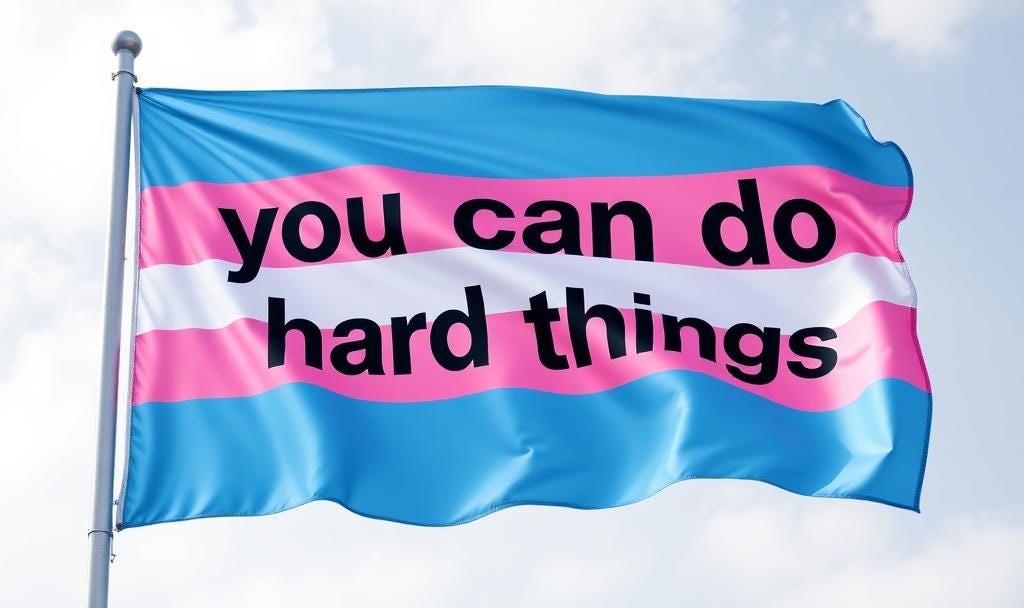What to Say (and Not to Say) to Terrified Trans-Identified Kids and Their Families Now
Hint: Stop threatening them with their own suicides
*edited 10/11 to integrate some reader suggestions.
Here are some things you can say to kids who have been worked into a frenzy due to the current political climate:
You can handle this. This moment in history, and in your life, is an opportunity to practice navigating adversity and finding peace in times of upheaval and uncertainty. Work on being comfortable being uncomfortable.
Just because people disagree with you doesn’t mean they hate you. Some people out there may disapprove of transgender identities, or medical transition, but it doesn’t mean they want to harm you or wish you ill. Many, in fact, may be praying for you. Try to extend them some grace and summon curiosity about why they see this issue so differently from the way you do.
Some people likely do think they hate trans people—just as people hate all kinds of groups: Jews, Mexicans, conservatives, anarchists, tap dancers, people who stand on the left side of the escalator instead of leaving a corridor for people to walk up. We are taxonomists by nature, sorting people into categories and making judgements based on them. They don’t know you personally.
You don’t need other people’s approval to feel safe. You can’t control other people’s actions, thoughts, or behaviors. What you can work on controlling is how you react to them. They may think trans people don’t exist, but you’re here, walking this earth, living your life, and their disagreement doesn’t negate your existence. The best rebuke to those who don’t understand or disagree is to succeed, to have a happy and fulfilling existence. Don’t focus on feeling safe. Focus on feeling fortified.
You may not be able to get what you want—for a while, or maybe ever. You might have your sights set on medical interventions, or even social transition, but nobody knows how all these conflicting executive orders and state laws are going to shake out. This is a challenge, to be sure. But it’s a great opportunity to interrogate your expectations and hopes: what do you want from transition? What’s missing from your life now? What else can you do to feed your soul and strengthen yourself during this topsy-turvy time? How can you live in the current moment, and not in the future?
Gender dysphoria is real, but it can be managed. Seek therapy as the first-line treatment.
Here’s what not to say:
ANYTHING ABOUT SUICIDE.
Do not tell them that their lives are at risk. Do not tell them that they’re vulnerable to suicide. Don’t tell them that they have higher suicide risk than non-trans people. (It’s not true. They may be at higher risk of suicidality than non-mentally ill people.)
Follow the guidelines for how to discuss, and report about, suicide.
These include:
Causes: Avoid reporting that a suicide death was caused by a single event, such as a job loss or divorce, since research shows no one takes their life for a single reason, but rather a combination of factors. Reporting a “cause” leaves the public with an overly simplistic and misleading understanding of suicide, and promotes the myth that suicide is the direct result of circumstances and is not preventable.
and
Magnitude: Research shows suicide is a complex health issue. Therefore, especially when the individual has been open about experiencing a mental health condition, it is helpful to frame the death in terms of a tragic health outcome. Do not refer to suicide as an “epidemic,” or “skyrocketing” as this has shown to cause contagion. When referencing suicide as a “leading cause of death,” include the most recent rates to ground people in facts.
Has the media been following these guidelines? Let’s check in.
NPR tells us: “Ultimately, the provider fears that if policy inhibits mental health care, suicide rates among transgender patients could rise.”
“Research shows young people who identify as transgender and nonbinary are at higher risk for negative mental health outcomes, including suicide. State laws targeting transgender people made trans and nonbinary people aged 13 to 24 more likely to attempt suicide in the past year, according to a recent survey conducted by the Trevor Project, an LGBTQ youth suicide prevention and crisis intervention organization,” writes USAToday.
NBC: “A recent peer reviewed study showed suicides attempts by transgender and gender non-conforming teenagers by 7-72% in states without care.”
On Vox, “Gender-affirming care has been shown to reduce the risk of suicide, and advocates are worried about what will happen if more kids around the country lose access to the care they need.”
I could go on, but honestly, it makes me want to…well, I was going to make a joke about suicide but I don’t want to do what I’m criticizing others of.
Please stop telling vulnerable children that their lives are at risk, that they are weak and hated. Please. Stop.
If you have suggestions for other talking points, please add them below.



I hate to do this, because I do believe in free speech, but I'm going to block the troll. It's really great for us to have this opportunity to observe, up close and personal, how a person who's only ingested activist talking point (alas, which are reprinted in NYT) processes information. But we've passed the tipping point and people are giving the troll a lot of air, and not being able to free themselves. I have him muted, but I've had requests to end his reign. So, sigh, I will.
“Others’ disagreement doesn’t affect your existence.”
“Gender dysphoria is real, but can be managed. 80% of those who suffer eventually desist: don’t close that door, or allow others to talk you into closing it.”
“Irreversible medicalization isn’t a good or ethical first treatment for mental health issues, and talk therapy isn’t conversion therapy.”